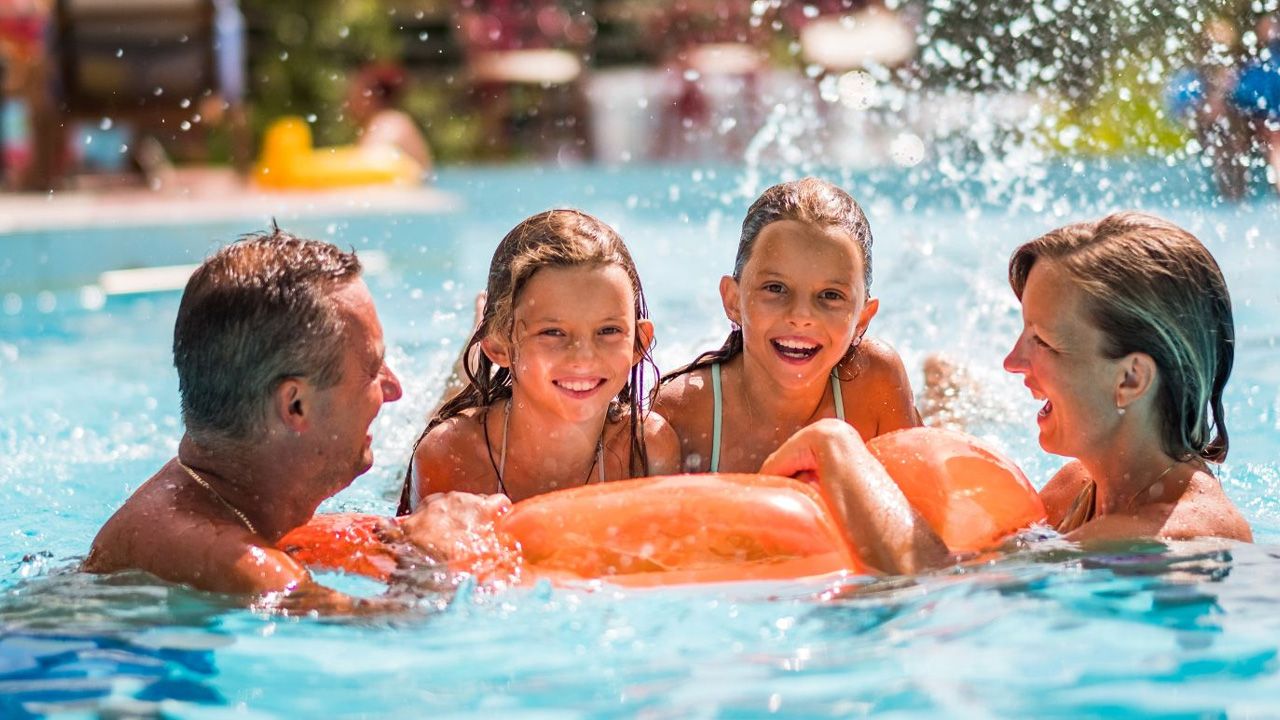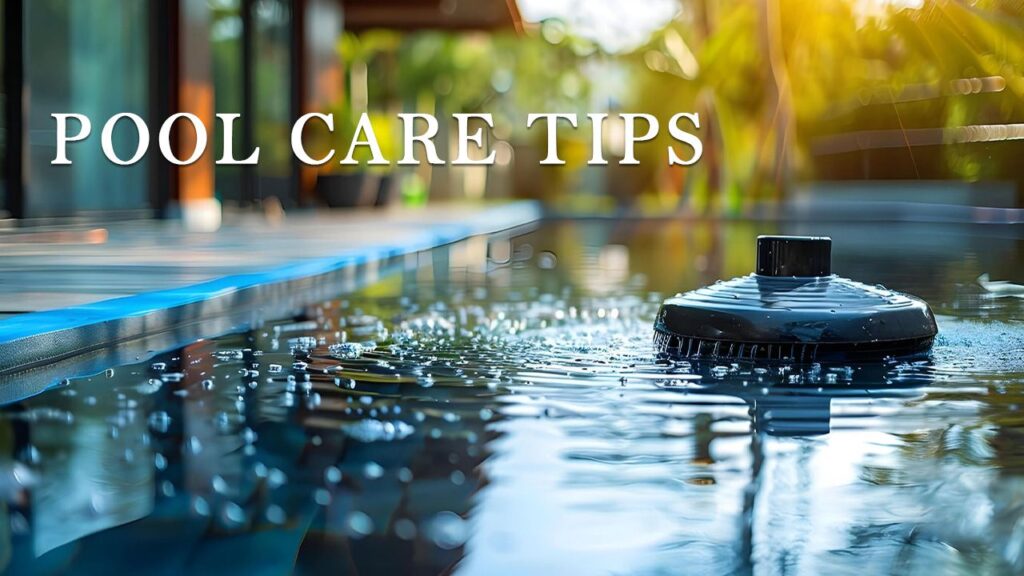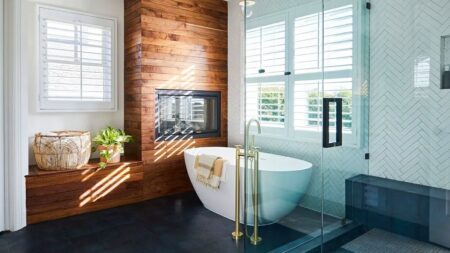Owning a swimming pool can be a wonderful luxury, providing a space to relax, exercise, and entertain. However, maintaining it in perfect condition requires effort and consistency. Clean water, balanced chemicals, and functioning pool equipment are crucial for a safe and enjoyable swimming experience. Neglecting these aspects can lead to costly repairs and safety hazards.
The warm, humid climate in Florida, presents unique challenges for pool maintenance. With average summer temperatures hovering around 90 degrees Fahrenheit and frequent rainfall, homeowners must contend with algae growth, water evaporation, and diluted chemicals.
Keeping a swimming pool at its best requires understanding these local conditions and taking steps to manage them effectively. Here are nine care tips to help you keep your swimming pool in perfect condition in the Florida climate so you enjoy this amazing outdoor feature without hassle.
Regular Cleaning is a Must
Routine cleaning is the foundation of keeping your swimming area in pristine condition. Bradenton’s climate, with its frequent rain and windy conditions, often introduces leaves, dirt, and debris into the water. These materials make the area look unappealing and create a breeding ground for algae and bacteria.
To keep the water clean, use a skimmer daily to remove debris and brush the walls and floor weekly to prevent dirt buildup. Vacuuming can also help remove sediment that accumulates at the bottom. Regular cleaning enhances the water’s appearance and prevents clogging in filters and other equipment.
Schedule Professional Pool Repair
No matter how diligent you are with maintenance, professional care is essential for keeping everything in working order. You can consult experts for pool repair in Bradenton, Sarasota, Tampa, or wherever you live to ensure that any issues, such as leaks, cracks, or equipment malfunctions, are addressed promptly.
With the area’s hot and humid weather, equipment like pumps and filters can wear out faster. Professionals can perform routine inspections, repairs, and upgrades to prevent small problems from turning into costly repairs. Regular service keeps your swimming area safe, functional, and ready for use year-round.
Test and Balance Water Chemistry Weekly
Testing and balancing water chemistry is critical for maintaining a safe swimming environment. Regular testing is even more important in Florida, where heavy rains can dilute chlorine levels. Imbalanced chemicals can irritate skin, cloudy water, or grow algae.
Use a testing kit to check pH, chlorine, and alkalinity levels weekly. Ideally, pH should range between 7.4 and 7.6, and chlorine should stay between 1 and 3 parts per million (ppm). Adjust levels as needed to ensure clean and safe water for swimmers.
Clean and Maintain Pool Filter
The filter plays a key role in keeping the water clean by removing dirt, oils, and small debris. The city’s higher-than-average rainfall increases the likelihood of contaminants entering the system, making regular filter maintenance a necessity.
Clean the filter twice a month, depending on how often the swimming area is used. If the pressure gauge on the filter rises by 8-10 psi, it’s time for a cleaning. Regular maintenance ensures that the filtration system operates efficiently, extending its lifespan and maintaining water clarity.

Control Algae Growth
Algae thrive in Florida’s warm and humid climate (specifically beach areas like Bradenton and Sarasota), making prevention a top priority. Algae growth can discolor the water, make surfaces slippery, and strain cleaning systems.
Preventative measures, such as maintaining proper chlorine levels and using algaecides, are key to keeping algae at bay. Brush walls and floors regularly to remove small algae formations before spreading. If needed, shock the water with a higher concentration of chlorine to kill any existing algae. Staying on top of algae prevention not only saves time but also reduces the risk of needing costly cleanup.
Also Read: Outdoor Features to Cool Off Your Backyard in Summer
Maintain Pool Pump and Circulation System
The pump and circulation system are essential for keeping water clean and preventing issues like algae growth. High temperatures and humidity can create ideal conditions for bacteria and algae, so ensuring proper water circulation is crucial.
Regularly inspect your pump for leaks, clogs, or unusual noises. Clean the pump basket and ensure that water is flowing properly through the system. A well-maintained pump ensures consistent water movement, which helps distribute chemicals evenly and prevents stagnant areas where algae can thrive. If issues arise, seek professional help to keep your system in top condition.
Monitor and Adjust Water Levels
Water levels can fluctuate due to heavy rain or evaporation from the intense Florida sun. Maintaining the correct water level is essential for the proper functioning of your swimming area’s filtration and circulation systems. If water levels are too high after a storm, use a pump or backwash to remove the excess.
When evaporation lowers the water level, add fresh water to bring it back to the ideal height, typically halfway up the skimmer opening. Regular monitoring ensures that your pool equipment operates efficiently and prevents unnecessary strain.
Invest in Regular Inspections
Even with consistent maintenance, regular inspections by a professional are key to catching small issues before they become major problems. A professional inspection includes checking for leaks, testing equipment, and assessing water quality.
This proactive approach not only extends the life of your pool but also saves money by addressing issues early. Schedule inspections annually or semi-annually, depending on usage of the water feature.
Use Energy-Efficient Equipment
Energy-efficient equipment is a worthwhile investment for homeowners looking to save money and reduce environmental impact. Options like variable-speed pumps, solar pool heaters, and LED lighting help minimize energy use without sacrificing performance. Variable-speed pumps adjust the flow rate based on need, reducing electricity consumption significantly compared to traditional single-speed pumps.
Solar heaters harness Florida’s abundant sunshine to keep water warm, while LED lights last longer and use less power than conventional lighting. Upgrading to energy-efficient equipment is smart for your wallet and the environment.
Final Word
Due to the unique climate conditions, maintaining a swimming pool in Florida requires a proactive approach. From heavy rainfall to high temperatures, these factors can affect water quality, equipment performance, and overall upkeep. With these pool care tips, consistent maintenance, and the right strategies, homeowners can enjoy their pools no matter the season and no matter where in Florida.
Follow Homecrux on Google News!




